40 years ago I missed out on a Forest away game. Again - I think, it was because of university. Instead of the relatively minor matter of Oxford United away though, like last time, this was a potentially fantastic trip to Athens for Forest's first major excursion into Europe, proper, and their first competitive match there for ten years.
So, in this blog I'll give university life a bit of a look before reviewing how Forest's season was starting to take shape now they'd hit some form with Gary Birtles as the new kid on the block. Forest had moved up to third spot and were keeping several unbeaten runs going, including the amazing John Robertson's 100th consecutive first team Forest appearance.
I didn't have time in the last blog post to cover all the clubs that took part in the European Cup of 1978-79 so here I'll parade the clubs that got knocked out in the first round, including Porto, who were knocked out by AEK. I won't bother with Liverpool, though, who were knocked out by Forest. We've all heard enough about them.
For each country, I'll do a summary of their national league's history with a specific view to examine how dominated it is by one or two big clubs. I've been griping on about this for years. Since the era of the Premier League there is a greatly reduced likelihood of anyone winning the English football league outside of the big six. Pertinent questions to ask are some of the following: How did England compare to all the other European nations before the current era? How 'open' was winning the English league when Forest won it, and how has it changed since? Has there been similar patterns elsewhere? This year, I'll look back on the past (pre 1979) and also at the period 1979-1999. Next year, all being well, I'll complete the picture by bringing us up to date.
Before doing a virtual trip back to the Nikos Gourmas stadium in 1978 for the AEK Athens v Forest match and a great first adventure in Europe proper for Clough & Taylor's heroes, I'll do a quick review of the history of .the "Athletic Union of Constantinople" club and their famous old ground that I never saw.
Finally, in the "what happened next slot", as I said, I'll look at how these countries' leagues did, and were represented in Europe, for the next 21 years to follow.
Previous Post: Oxford Utd (away) League Cup 3rd
University Life
I had settled in pretty well to academic life at Nottingham University and was really enjoying studying things I was a) interested in and b) could actually cope with.
I'd changed from Mathematics (with subsidiary Genetics) to Zoology/Pharmacology (Joint Honours) and although I missed the genetics (and my gorgeous tutor) I did enjoy the two courses I was involved with.
The Zoology course went through a "progression" of species from relatively simple to more complex ones. For each topic I was super-keen and bought most of the text books on the reading list. Perhaps the oddest purchase was Marshall & Williams' Textbook of Invertebrates. I don't think I have ever opened it since the course. The Zoology department had a quaint old feel about it and it was headed, appropriately, by a Forest fan, Peter Usherwood, who I would get to know a bit better in the next two years.
 |
| One of the first textbooks I bought |
The Pharmacology course was over in the Pharmacy building near Lakeside. Lectures were full of medical students who, I have to say, I took an instant dislike to. As always during freshers' week various groups are formed to peddle to the new, green, students for them to join, including academic ones such as Medsoc. I'll never forget the slogan they had on their T-shirts that year...
"Medical Students.... A Cut above the Rest"
...under an image of surgeon with a scalpel looking menacingly down at you.
Says it all really.
I must admit I did enjoy learning things medical though, and pretended that I was "like a doctor" really.
I just did the best bits of the pharmacy course, though - the physiology and pharmacology.
There were only three of us doing this particular combination: Angela Wilson, a nice girl from Grimsby and Davinda Sharma, the sweetest, tiniest, most polite, Indian girl, who wouldn't say boo to a goose - were the others. I've never been good at conversations when there are three or more people and Ange and Davinder used to dominate with endless small talk for hours. "It's funny that ..." Angela would start, but it rarely was. "I'm lucky really..." Davinda would reply, leaving me thinking I wasn't.
I think it must have been some time before Christmas when Davinda announced that she was going to get married. She seemed genuinely happy about the prospect of an arranged marriage to some Indian guy she'd never met before. Later I saw him, he must have been twice her age, height and weight. I hope she's still as happy as she was then and I hope she still thinks she's lucky.
The three of us would often meet for a coffee in the Zoology department before or after lectures, or tutorials. The pharmacology ones were especially memorable, as we had the privilege of having them with Professor James Crossland, head of Pharmacy at the university and the self-deprecating author of Lewis' Pharmacology. (He edited the text for years but never agreed to have it's name changed from the original author.) A lovely, witty, man.
Good old Jim. My mind still carries many memes that came from him. Like... "The seat of the peripheral resistance is in the arterioles" and "the best drug ever invented is... aspirin" and "Colonel Qaddafi is absolutely crazy."
 |
| Forest fan, Peter Usherwood, neurologist |
Of course, it wasn't all studying in those early weeks. Apart from the football, I was into the music scene quite a bit and was into quite a few punk rock bands...
The Buzzcocks...
Sham 69...
Public Image...
There was some other big news at the time. It wasn't something I was particularly bothered about, as I'd already been an atheist for ten years but you couldn't help hearing about the appointment of Pope John Paul II. I must have been aware of it mainly through my dad, as this new pope was Polish, the first non-Italian to get the No 2 seat (under God himself!) in the Catholic Church in centuries. Dad always used to say he was Lithuanian really.
Forest's Recent Form
With most of my attention on studies - yes, hard to believe, I know, but I was determined not to to stuff up university again after my previous year - I hadn't been to many games so far in the season. In fact, since term started, I'd only seen one game. Having missed Oxford United away, my first match whilst at Uni was to watch Forest beat Wolves at home 3-1.
I must say it was really quite an exciting novelty for me to go to a Forest match from somewhere that wasn't my actual home. A quick walk from Sherwood Hall onto Derby Road to catch the bus to the city and then the usual football special from Slab Square to the City Ground had a magical feel to it and one I'd never take for granted.
Nottingham Forest
1 Peter Shilton, 2 Viv Anderson, 3 Frank Clark, 4 John McGovern, 5 Larry Lloyd, 6 Kenny Burns, 7 Martin O'Neill, 8 Archie Gemmill, 9 Gary Birtles, 10 Tony Woodcock, 11 John Robertson.
Goals: Martin O'Neill 1, Gary Birtles 2.
Substitutions: Ian Bowyer (12) came on for Tony Woodcock(10).
Wolverhampton Wanderers
1 Paul Bradshaw, 2 Geoff Palmer, 3 Derek Parkin, 4 Peter Daniel, 5 Bob Hazell, 6 John McAlle, 7 Martin Patching, 8 Willie Carr, 9 Ian Arkwright, 10 Melvyn Eves, 11 Maurice Daley.
Goals : Melvyn Eves 1.
Substitutions: Norman Bell(12) came on for Willie Carr (8).
Birtles made the headlines again scoring two as Forest seemed to be finding their feet at last.
However, to stop us getting too cocky, elsewhere, news came in from Carrow Road that Liverpool's awesome early form just seemed to go from strength to strength.
Here are the highlights of their 4-1 win...
Elsewhere, Everton and Coventry were held so Forest were able to gain some ground at the top of the league on them. Spurs got an impressive win at in-form Albion.
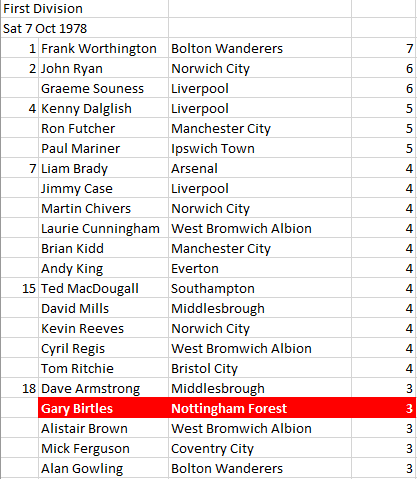 |
| Gary Birtles, from nowhere, into the top 20 first division scorers |
 |
| 38th home game without defeat (in all competitions) |
The Monday after, 9th October, Brian Clough and Peter Taylor travelled with the England Youth party to Las Palmas for a friendly international. Amazing to remember that they would have taken the England job if Ron Greenwood hadn't been appointed and then none of this would have happened.
A few days later Sammy Chapman, of all people, won a test case in court about a player's testimonial fee - in future it will be tax free. His recent testimonial, against a Don Revie XI must have been heavily taxed, I can only imagine.
The Saturday after that Forest played away at Bristol City. Again, I missed it and only really heard about by reading the Football Post in the evening afterwards.
I find it incredible to think that no-one (as far as i know) made any fuss whatsoever about the significance of this match. It was, as far as I can tell, John Robertson's 100th consecutive match for the reds.
I gave Robbo a half-decent write up in last season's blog post about the West Brom (away) game (that Forest drew 2-2 with a John Robertson penalty sealing the point) so I won't repeat myself again here.
But suffice it to say I think we've all underestimated Robbo's contribution to Forest's glory years.
And remember, he wasn't even half way through his run at this stage!
Every Forest fan (and anyone who loves the game) should have a copy of his book "Super Tramp".
 |
| Robbo's record for Forest |
As I said, I missed the game at Ashton Gate but Forest won again.
Bristol City
1 John Shaw, 2 Gerry Sweeney, 3 Don Gillies, 4 Gerry Gow, 5 David Rodgers, 6 Norman Hunter, 7 Trevor Tainton, 8 Tom Ritchie, 9 Joe Royle, 10 Peter Cormack, 11 Kevin Mabbutt, 12 Clive Whitehead.
Goals: Tom Ritchie 1 (pen.).
Nottingham Forest
1 Peter Shilton, 2 Viv Anderson, 3 Frank Clark, 4 John McGovern, 5 Larry Lloyd, 6 Kenny Burns, 7 Martin O'Neill, 8 Archie Gemmill, 9 Gary Birtles, 10 John O'Hare, 11 John Robertson.
Goals : Gary Birtles 1, John Robertson 2.
Elsewhere, of course, Liverpool just kept on steaming forward, thrashing Derby County 5-0 at Anfield...
Also televised that day was Leeds United 1 West Brom 3...
Coventry City got beaten at Manchester City so Forest now found themselves up in 3rd place in the league, just two points behind Everton, but a gaping five behind Liverpool. At least Forest were still unbeaten and had now started scoring goals themselves.
Here's a league table for Forest stats nerds... a table that contains the matches for Forest's title winning season and the one after, combined. Liverpool, at this stage, look like they're going to close the gap completely. A seven point margin, earned after a whole season of dominating, already looked fragile just a few weeks into the season.
Watch this space!
Another goal from Birtles put him into the top 13 first division scorers, along with good old Robbo!
Here are John Robertson's 100 (so far) consecutive matches for Forest...
That is already a pretty incredible record and it was set to get much better.
The Bristol City win was Forest's 36th league game without defeat.
That is already a pretty incredible record and it was set to get much better.
The Bristol City win was Forest's 36th league game without defeat.
So, what about this European Cup thing?
To Europe, To Europe, lala la lalalala lala lalala la la!
Before looking at Forest's first journey into Europe since November 1967 (when they lost 1-0 at FC Zurich to get knocked out of the Fairs Cup 2nd round on away goals) I want to do a survey of all the countries and champions who had been eliminated in the first round. And, yes, in those days the only club allowed to play in the European Cup (now, ironically called "European Champions League") were national champions, or previous winners.
I wanted to do this for the Liverpool game but didn't have time.
So, apologies here. Lots of stats, not much discussion.
A Reminder of the Clubs Out already
1. Divizia A (Romanian) Champions Steaua Bucaresti
Steaua Bucharest, you may remember, were eliminated in the preliminary round by French champions, Monaco. So, just for completion's sake, here's their record too.
This was Steaua's championship winning season, on goal difference from Arges Pitesti - ironically, the team destined to win Divizia A this (1978-79) season and meet Forest in next season's European Cup.
Steaua were the dominant side in Romanian football, having won it 9 times out of the 60 it had been run. No less than 18 other clubs had won the Romanian league, which turns out to be quite a high number and although Bucharest teams have dominated the league, titles have been shared by three clubs and seven clubs altogether had won it four or more times by 1978.
Notice the [Cumm%] column, This indicates what percentage of the total championships in Romania had been won by the top n teams. It's an indication of how much the domestic football league is dominated by a few big clubs.
Another 16 Countries Exit Europe
So, this was the list of matches for the second leg games in the first round leading to 16 more teams being eliminated.
I'll now go through the sixteen that lost in the first round, as I did for Steaua Bucharest.
2. Serie A (Italian) Champions - Juventus
The shock of the round was probably Rangers' surprising defeat of Italian champions Juventus.
Here's how they did it...
Juventus had won the Serie A quite comfortably the season before to earn their place.
Juventus were, in 1978, the dominant Italian club side, as they very much still are today. Nearly a quarter of all 76 Italian league championships had been won by them. The two Milan giants come next, the three of them accounting for half of all league winners.
3. Primeira Liga (Portugal) Champions Porto
Forest's opponents, AEK, had beaten Porto 6-1 in Athens in the First Round first Leg and although they lost the second leg in Porto 4-1, it was enough to knock out the Portuguese outfit.
This had been Porto's 6th Portuguese title win.
But they lagged a long way behind the No 1 club, Benfica, who had won the title an incredible 28 times out of the 44 years the competition was played. Sporting Lisbon were the big No 2 club and the two of them accounted for 84% of all Portuguese title wins in 1978. Only two other clubs had won the league making it one of the most big club dominated leagues in Europe.
4. Ligue 1 (French) Champions - Monaco
Having beaten Steaua Bucharest in the preliminary round, French champions Monaco might have hoped for a bit of a run in the competition but they were surprisingly knocked out by Swedish club Malmo - someone I'll have a lot more to say about later.
Malmo knock Monaco out in the first round...
It had only been Monaco's third Ligue 1 victory when they pipped Nantes by one point the season before.
The French league, in 1978, was quite an open one. St Ettienne dominated, especially in the 60s, but 13 clubs had won the title in 60 years and five clubs had won it four or more times.
5. Belgian Champions Club Bruges
Another major football nation that had their club eliminated in the first round was Belgium.
Club Bruges had beaten the Polish champions Wisla Krakow at home 2-1 but lost 3-1 in the beautiful Polish city in the second leg.
Bruges had pipped Anderlecht for the league the season before.
6. Yugoslav First League Champions Partizan Belgrade
These, remember, were the days before the the break-up of the Communist Block and Serbian dominated Yugoslavia still existed as did the Russian dominated Soviet Union. Representing the southern slav nation in the European Cup was Partizan Belgrade but they were knocked out of the first round, on penalties, by a team representing another country that no longer exists, The DDR (Deutsch Demokratische Republik) or East Germany champions, Dynamo Dresden.Here are the highlights...
Partizan had beaten their Belgrade rivals, Red Star into second place.
Red Star were the No 1 team in Yugoslavia at the time but three clubs had won over 80% of the titles in the 32 years the league had been running.
7. Nemzeti Bajnokság (Hungary) Champions Ujpest Dozsa
The Hungarian champions were Ujpest Dosza, a famous old club - perhaps the best known club to play in purple, the same colours of my local A-League team Perth Glory. Ujpest is a suburb to the north of Budapest. Dozsa is the name of a famous Hungarian "man at arms" or nobleman from the middle ages.
They had lost in the first round to the Czechoslovak (another country that no longer exists) champions, Zbrojovka Brno.
Ujpesti had pipped another famous old Hungarian club, Honved to the title the season before.
The No 1 Hungarian team, at the time, though were Ferencvaros. Three teams had won 75% of the 76 Hungarian titles since their football league begin in 1901.
8. Süper Lig (Turkish) Champions Fenerbahçe
Turkey were represented in the European Cup by their No 1 club, Fenerbahce.
They had been thrashed in the first round second leg 6-1 by PSV Eindhoven, reversing a slender 2-1 deficit from the first leg.
Fenerbahce had pipped Trabzonspor for the title the season before.
Only four clubs had won the 22 Turkish league titles up to 1978.
9. Dansk Superliga - Odense
Denmark was represented by Odense Boldklub (Bold, just means "ball" apparently).
Odense had won the title at a canter, pushing Boldklubben 1903 into second place. Not very imaginative, these Danes, most clubs seem to be called Boldklub something or other, often with the year of their formation in there.
Twelve clubs have won the Danish league and seven of them have won it four times or more.
Odense had won the title at a canter, pushing Boldklubben 1903 into second place. Not very imaginative, these Danes, most clubs seem to be called Boldklub something or other, often with the year of their formation in there.
Twelve clubs have won the Danish league and seven of them have won it four times or more.
 |
| Denmark have a pretty open league |
10. Mestaruussarja (now called Veikkausliiga) (Finland) Champions Haka
Representing Finland were Haka from the small (population about 20,000) industrial town of Valkeakoski, 150 km north of Helsinki.
Haka lost to Dinamo Kyiv in the first round. They lost 1-0 at home in the first leg and then lost 3-1 in the USSR in the second leg...
It always surprises me how few of the teams in the Finnish league are from the capital city.
Finland had a very open league and no less than 19 clubs have won the title in the 68 years it's been going. HJK are the No 1 club but they've only won the league 11 times (16% of occasions).
Haka lost to Dinamo Kyiv in the first round. They lost 1-0 at home in the first leg and then lost 3-1 in the USSR in the second leg...
It always surprises me how few of the teams in the Finnish league are from the capital city.
Finland had a very open league and no less than 19 clubs have won the title in the 68 years it's been going. HJK are the No 1 club but they've only won the league 11 times (16% of occasions).
11. Úrvalsdeild karla (Icelandic Champions) IA (Íþróttabandalag Akraness)
In 1978 Iceland weren't the footballing power they are today. They were represented by a club from the town of Akranes, a small town of 7,000 across the bay from Reykjavik.
IA, as they're known, drew West German champions FC Koln (Cologne) and managed to hold them to a 1-1 draw in Iceland. Unfortunately, they'd lost the first leg in Germany 4-1 and so were knocked out.
IA had pipped Valur Reykjavik the season before.
Íþróttabandalag Akraness (Akraness sports club) badge...
IA, as they're known, drew West German champions FC Koln (Cologne) and managed to hold them to a 1-1 draw in Iceland. Unfortunately, they'd lost the first leg in Germany 4-1 and so were knocked out.
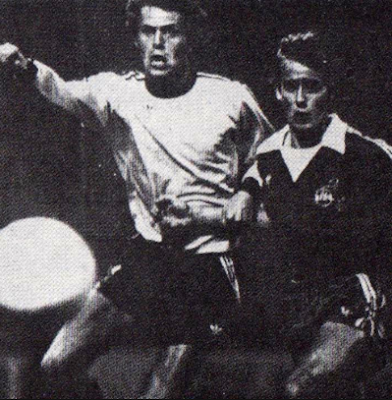 |
| IA, IA, we are the Iceland boys... losing to FC Koln |
IA had pipped Valur Reykjavik the season before.
Íþróttabandalag Akraness (Akraness sports club) badge...
Only six clubs had won the Icelandic league in 1978. 75% of the 66 titles claimed by the big three, all from Reykjavik.
12. Northern Ireland Champions - Linfield
It still seems bizarre to me that Northern Ireland get to have their own place in the European Cup. In 1978, as usual, they were represented by Linfield.
The Belfast club had done well and almost got through to the second round. They'd drawn 0-0 with Norwegian champions Lillestrom at home but then lost 1-0 away in the second leg.
Almost half of all the 78 titles had been claimed by Linfield.
The Belfast club had done well and almost got through to the second round. They'd drawn 0-0 with Norwegian champions Lillestrom at home but then lost 1-0 away in the second leg.
Almost half of all the 78 titles had been claimed by Linfield.
13. Πρωτάθλημα (Cypriot League Champions) Omonia Nicosia
Cyrus were represented by AC Omonia Nicosia. They had been knocked out (on away goals) by Irish champions Bohemians.
Second place APOEL (which stands for Atheltic Football Club of Greeks in Nicosia) are the No 1 club in Cyrpus.
Second place APOEL (which stands for Atheltic Football Club of Greeks in Nicosia) are the No 1 club in Cyrpus.
14. Luxembourg National Division Champions - Progres Niederkorn
In the south west corner of Luxembourg, snuggled up to the Belgian border to the north and the French border to the south is the tiny (just 2,000 people live there) town of Niederkorn. So it was an impressive achievement for them to win the national league in 1978, for only the second time in their history.
They were rewarded with a draw against the No 1 club side in Europe, Real Madrid. The result was in no doubt. Real won the first leg 5-0 and slaughtered Niederkorn 0-7 away.
No Progres for them, then!
The Luxembourg championship has been dominated by Jeunesse D'Esch but 13 clubs have won their league since it began in 1909.
Valletta were knocked out by Grasshoppers of Zurich in the first round. They got hammered 8-0 in the first leg in Switzerland and lost the second leg 3-5 at home.
They were rewarded with a draw against the No 1 club side in Europe, Real Madrid. The result was in no doubt. Real won the first leg 5-0 and slaughtered Niederkorn 0-7 away.
No Progres for them, then!
The Luxembourg championship has been dominated by Jeunesse D'Esch but 13 clubs have won their league since it began in 1909.
15. Il-Kampjonat Premjer (Maltese) Champions - Valletta
Maltese champions were Valletta, named after the capital city.Valletta were knocked out by Grasshoppers of Zurich in the first round. They got hammered 8-0 in the first leg in Switzerland and lost the second leg 3-5 at home.
16. Kategoria Superiore (Albanian Champions Vllaznia
Now, to Albania, represented by Vllaznia (yes, that's spelled with two "l"s), from the northern town of Shkoder, a stone's throw from the border with Yugoslavia (Montenegro today).
A shock looked on the cards as they won their home first leg, against Austria Vienna, 2-0.
 |
| Vlaznia 2-0 Wein 0 |
The Austrians, however, powered back in the second leg 4-1 to win 4-3 on aggregate.
Only 5 clubs have won the Albanian league with 85% of the 39 titles being won by the big three.
17. England's Brexit - Liverpool
Last, but of course, not least - I have to complete the first round exits from Europe with this one...
I can't help but show this clip again of Forest's monumental 2-0 defeat of Liverpool.
And just look at that table...
 |
| Bye Bye, 'Pool! |
Forest were the 24th club to win the football league, making it the most open in Europe in 1978 that I've surveyed so far. No less than 18 clubs had won the league more than once and six clubs had won it six times or more.
As we'll see, though, this "openness" would soon become eroded. In the forty years since Forest's title win, only one new club would be added to this hall of fame... Leicester City, of course.
As we'll see, though, this "openness" would soon become eroded. In the forty years since Forest's title win, only one new club would be added to this hall of fame... Leicester City, of course.
 |
| Lots of thin slices in the English Pie |
So, here's a summary of the 17 countries surveyed so far. (It also includes Greece, which I'll review next.)
I've come up with a formula to estimate how 'open' the league is. It's basically the number of clubs that have won the league in that country (as a percentage, so divided by the number of years its been going) multiplied by a factor, minus the average of the five cumulative title wins by the biggest clubs.
As an example, take England. 24 champions in 80 years gives a figure of 30%. In 1978 Liverpool had won the league most (10 times) - 13% of all titles. 2nd was Arsenal. The top two account for 23% of title wins. 3rd was Everton and Manchester United both on 7. Everton's haul takes it to 31% Man U to 40%. The fifth most total of 6 takes the cumulative to 48%. So I average those numbers, giving 31%.
Finally, as it's all relative, I multiple the first figure, by a factor (in this case approx 3.2) to make the overall total add up to 0 so that we can see a figure indicating the most open relative to the least.
Of course you could criticise my formula and my methods but I think it gives a reasonable estimate of how open a league is and, as I had expected, the English league, in 1978, certainly comes out as one of the most open so far.
As the season progresses, I'll add the other 16 European countries to the table to see if England were still on top by the end.
A.E.K. Athens
So, what about AEK Athens? They're a pretty old club, having formed in 1924 by Greek refugees from Constantinople (as they called it, it's of course known as Istanbul today). They were refugees from the Greco-Turkish war.
The club's name in full is...
Αθλητική Ένωσις Κωνσταντινουπόλεως;
Athlitikί Énosis Konstantinoupόleos,
"Athletic Union of Constantinople")
They're often just referred to as Enosi (or Union). Clearly the club founders had a hankering for the Byzantine empire, as their club crest is taken from the Byzantine crest.
Their Nikos Gourmas Stadium was as old as the club..
In 1978 they started building a peculiar new stand behind the goal with a set of seats on the roof.
I do not think it was completed when Forest played there.
To add Greece to my survey (and make up the 18th country in my table) we see that the Greek league has only been won by 5 clubs and 90% of the 42 titles have been claimed by just three, one of which is AEK.
Olympiacos and Panathinaikos are the big two. By my reckoning, only Portugal had a less open league in 1978.
Athlitikί Énosis Konstantinoupόleos,
"Athletic Union of Constantinople")
They're often just referred to as Enosi (or Union). Clearly the club founders had a hankering for the Byzantine empire, as their club crest is taken from the Byzantine crest.
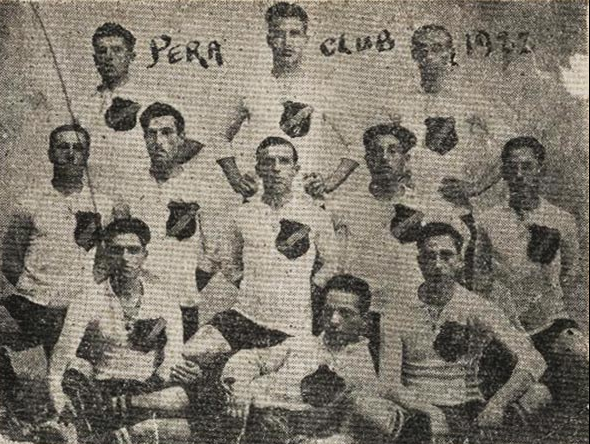 |
| Early team photo |
In 1978 they started building a peculiar new stand behind the goal with a set of seats on the roof.
I do not think it was completed when Forest played there.
 |
| Skepasti (roof) stand where the AEK "Ultras" go |
To add Greece to my survey (and make up the 18th country in my table) we see that the Greek league has only been won by 5 clubs and 90% of the 42 titles have been claimed by just three, one of which is AEK.
Olympiacos and Panathinaikos are the big two. By my reckoning, only Portugal had a less open league in 1978.
The Match
So, to the match.
I still feel regret, even now, that I didn't go to this one. Of course, I have no memories of it at all, not even from watching the video clips.
So I'll just post what photos, newspaper reports and video clips I can find.
Video footage of the 2-1 win.
 |
| Woodcock beats his man and gets in a cross... |
 |
| McGovern scores... 1-0! |
 |
| Tony Woodcock is brought down |
 |
| So is John Robertson |
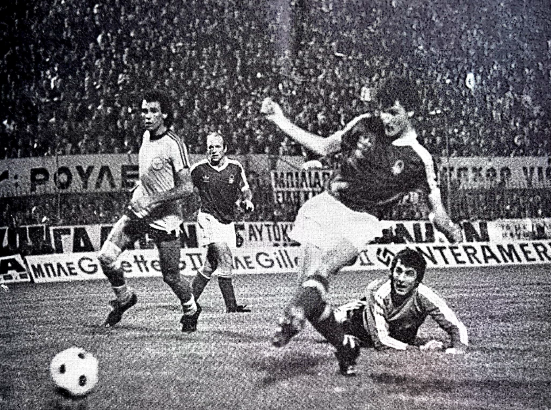 |
| Birtles makes it 2-0 |
 |
| ... and almost a third |
 |
| Frank Clark on the attack too |
Here's some video footage of another match that night... Real Madrid 3 Zurich Grasshoppers 1
So, Forest were in a good position for the second leg in Nottingham in two weeks. A match I definitely would NOT miss.
What Happened Next?
Finally, I'll finish off by reporting more league title summaries of the countries reviewed earlier.
This time, though, the period is from 1978-79 to 1998-99, 21 years altogether.
It's interesting to note that in some countries a new team had dominated in this period but overall the number of wining teams seems to have gone down everywhere.
This time, though, the period is from 1978-79 to 1998-99, 21 years altogether.
It's interesting to note that in some countries a new team had dominated in this period but overall the number of wining teams seems to have gone down everywhere.
 |
| Thicker Red Pie Slices |
For me, the most alarming change is that England slipped from having the most open league in Europe to being pretty average, and this was mainly before the days of the Premier League. Seven clubs winning the league in 21 years is pretty reasonable but main 'problem' was Liverpool's dominance in the 1980s and Manchester United's dominance as the Premier League era set in. 14 out of 21 titles were won by those two.
Portugal remained the most closed league, even though Porto took over from Benfica as the No 1 club in this period. Denmark and France had the most open leagues in the 21 years from 1978-1999.
I'll add eight more to the table after the AEK Athens second leg write up.





















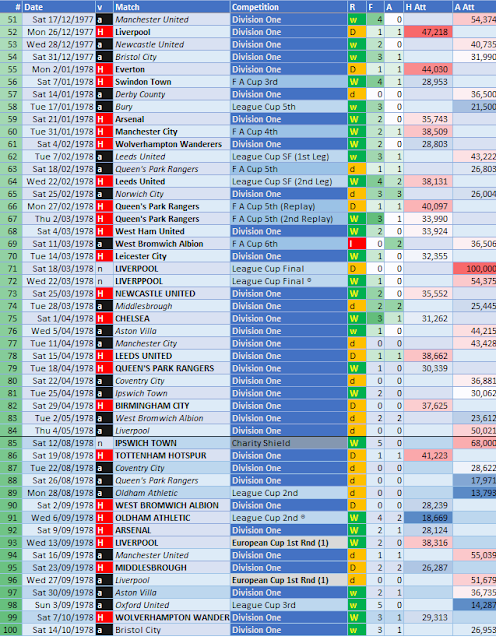
































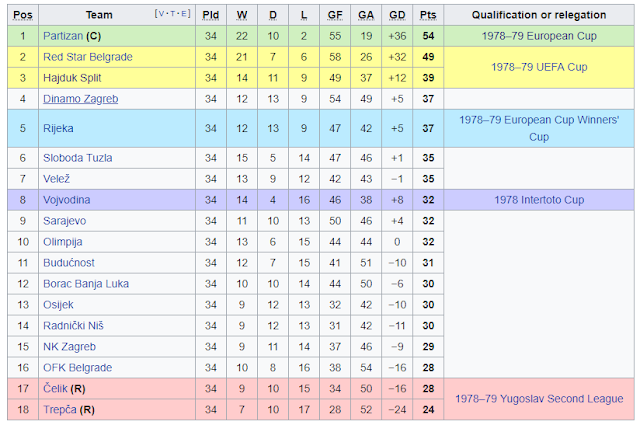























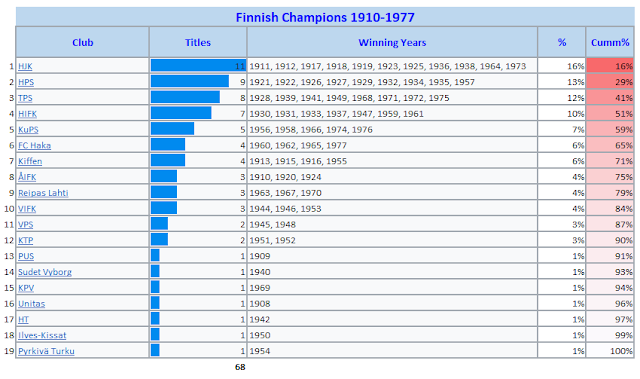













































































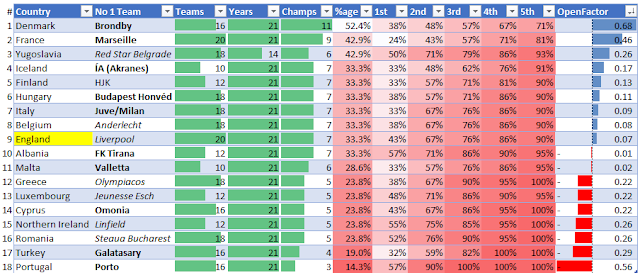
Comments
Post a Comment